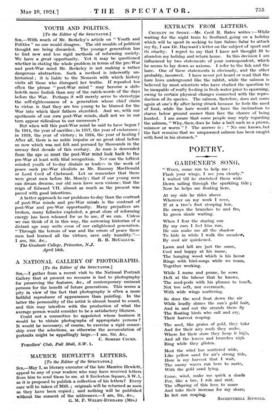YOUTH AND POLITICS.
[To the Editor of the SPECTATOR.]
Sin,—With much of Mr. Berkeley's article on " Youth and Politics " no one would disagree. The old moulds of political thought are being discarded. The younger generation has to find new and less rigid methods of reforming society. We have a great opportunity. Yet it may be questioned whether in stating the whole problem in terms of the pre-War and post-War mind Mr. Berkeley is not making a rather dangerous abstraction. Such a method is inherently un- historical ; it is liable to the Nemesis with which history visits all those who disregard her truths. If repeated too often the phrase " post-War mind " may become a shib- boleth more foolish than any of the catch-words of the days before the War. Perhaps it will merely serve to stereotype the self-righteousness of a generation whose chief claim to virtue is that they are too young to be blamed for the War into which their fathers stumbled. And we, with our apotheosis of our own post-War minds, shall not we in our turn appear ridiculous to our successors ?
But when will this post-War mind be said to have begun ? In 1914, the year of sacrifice ; in 1917, the year of endurance ; in 1919, the year of victory ; in 1924, the year of healing ? After all, there is no noble impulse or no great ideal before us now which was not felt and pursued by thousands in the uneasy first decade of this century. As man is descended
from the ape so must the post-War mind look back to the
pre-War at least with filial recognition. Nor can the loftiest minded youth of to-day disdain as leaders in the work of peace such pre-War idealists as Mr. Ramsay MacDonald or Lord Cecil of Chelwood. Let us remember that there were great men before Mr. Mosely ; that if our young men can dream dreams, our old men have seen visions ; that the reign of Edward VII. almost as much as the present was paved with good intentions.
A better approach to our problems to-day than the contrast of post-War minds and pre-War minds is the contrast of post-War and pre-War opportunity. Many prejudices are broken, many fallacies exploded, a great store of reforming energy has been released for us to use, if we can. Unless we can think of it in this way, the sorrowing historian of a distant age may write even of our enlightened generation. " Through the terrors of war and the errors of peace these men had learned all the virtues, save only humility."—






































 Previous page
Previous page